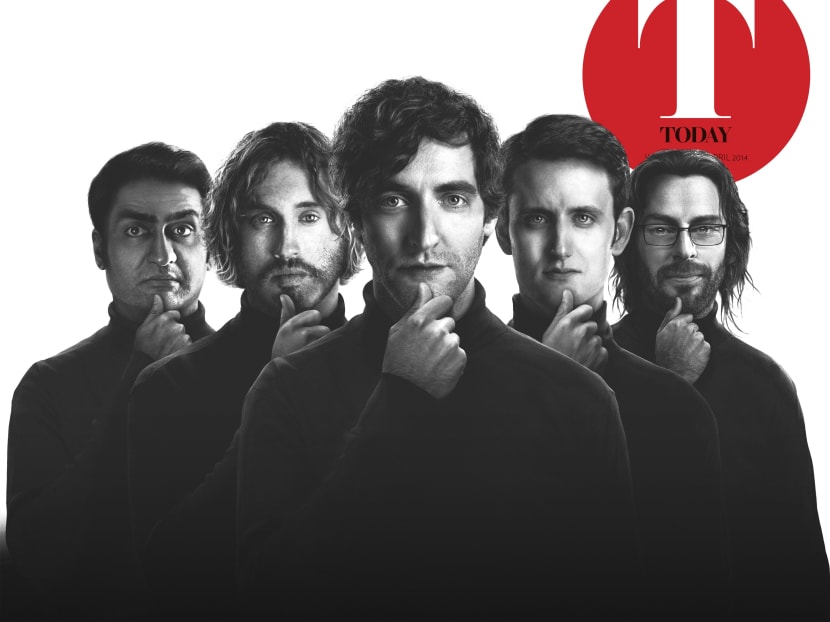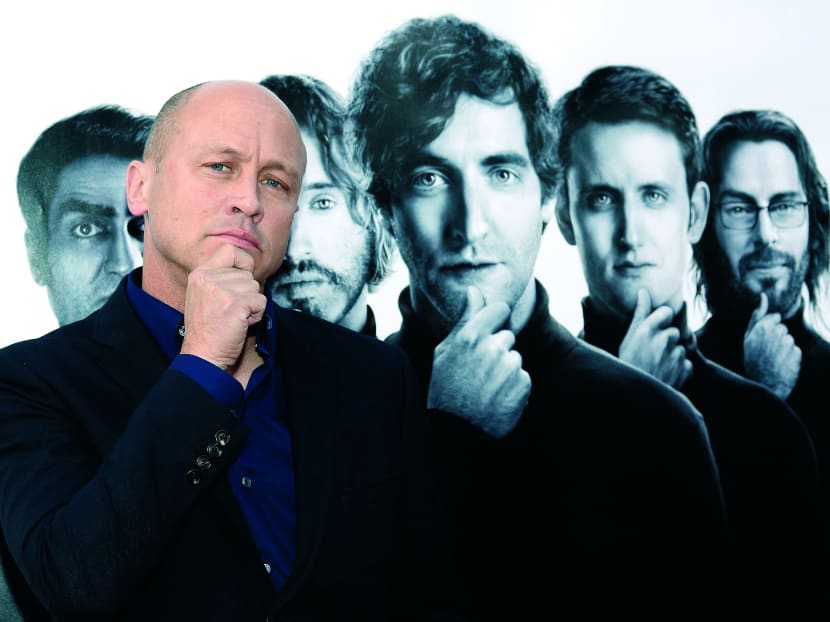The geek chorus of Silicon Valley
LOS ANGELES — This technophobe is obsessed with HBO’s latest show Silicon Valley, and you should be too. It’s not just because geek chic has become a defining aesthetic of the 21st century. It’s all because of Mike Judge.


LOS ANGELES — This technophobe is obsessed with HBO’s latest show Silicon Valley, and you should be too. It’s not just because geek chic has become a defining aesthetic of the 21st century. It’s all because of Mike Judge.
I grew up on Judge’s tongue-in-cheek work, which informed and taught me (and my generation) to have a sense of humour about the absurdity of this crazy world we live in. And he’s doing it again.
Silicon Valley is Judge’s latest brainchild and it’s a hilarious, satirical look at the idiosyncrasies and pretensions of the high-tech gold rush nerdocracy ruled by boy-genius billionaires and Internet upstarts. It follows programmer Richard Hendrix (played by Thomas Middleditch) and his friends as they try to make it big. Yes, there are pratfalls — and none of them are nice ’n’ neat. What else would you expect from the creator of Beavis And Butt-head and King Of The Hill, not to mention his directorial efforts Office Space, Idiocracy and Extract?
Judge said his team is determined to ensure Silicon Valley is as realistic a depiction as possible. He should know — after all, he used to work there. He shared that he knew and dealt with some tech billionaires “back before the first bubble burst and when everyone wanted to do animation”.
“Yeah, we did a lot of research,” the former Silicon Valley test engineer said. “We definitely went to great lengths to get everything right. We went deep into it.
“There’s not a one-to-one for-one representation of any real guy,” he added. “There’s sort of a billionaire vibe ... that kind of goes ... into two categories: The kind of Aspergery-type and then the sort which is ... more aggro.
“I really wanted to do something with this for a long time. Look at these billionaires ... they are introverted and socially awkward and no one is saying no to them. It’s kind of perfect for comedy.”
Q: The cast has so many comedians, a lot of them improv guys.
A: What happened which was a little different from usual was that four of them, Kumail (Nanjiani, who plays Dinish), Martin (Starr, who plays Gilfoyle) , Josh Brener (Big Head) and T J (Miller, who plays dotcom millionaire Erlich), all read for T J’s part. We felt that these guys were really good and seemed like they were of this world. So we went back and kind of specifically tailored ... rewrote it for them, adjusted the characters around. And so that was a little different. I didn’t know all of them had worked together (before) and that they were all improv guys. It was really just trying to find people who I could believe were programmers in this world. And it ended up that they were all these comedians.
Q: How much of your own experience as a Silicon Valley test engineer did you put in the show?
A: It was more of a general overall vibe. I worked in Silicon Valley back in 1987, 1988 and even though it’s different technology and different things were going on, the character types are pretty much the same. Programmers will always be the same type of people. There have been some specific things. There is a scene when there is the guy talking about one character, tech billionaire Galvin Belson, like he’s some kind of a cult leader. That is almost word-for-word (what happened) in a real meeting that I had with one of the billionaires. But in my story, he actually never showed up! That line — “Oh god, if you meet him, oh my God! I’m the Vice-president of blah blah blah and I only get to see him once a month. For 10 minutes.” And then the other guy goes, “10 minutes? That’s amazing!” — that is all word-for-word.
Q: What was the reason you left Silicon Valley?
A: Oh god, I was miserable! Well, I was more of a cog in the wheel. I made the movie, Office Space, kind of based on why I left. Although I think if I was 22 today, I might have been trying to start an app or something like that. You know, I got my degree in physics, and me and my lab partner actually won best project back in 1985 in UC San Diego. It was a micro-processor balancer ... and I was thinking it would have been cool if I could have made a toy out of this. But really, I wouldn’t have known how to find somebody to give me some money to have made that! I can’t pitch anything to anybody. But now, you can be in a coffee shop and someone would be talking about how they have an idea for an app that they would want to get started. I mean, the girl who used to cut my hair back when I had hair, now has an app that she is funded for! I guess what I’m saying is that if I’m a youngster today, I can see myself getting into that ... it’s kind of more tangible now.
Q: What makes this world so interesting to tell stories about?
A: (laughs) This was like when I was first pitching the show — and I’m horrible at pitching! — to me, what is interesting about this world is that these characters, these types of personalities like Mark Zuckerberg, Steve Wozniak, Paul Allen, Bill Gates: If they had been born 200 years ago, I don’t think they’d been the richest people in the world. I think they would be probably making good money, probably teaching at a university somewhere, working in navigation, engineering or something like that. It’s a unique time in history where these people are one of the richest people in the world. I mean, there are some alpha males (in Silicon Valley), but there is a big difference between John D Rockefeller, or whoever were conquerors 200 years ago, and somebody like Paul Allen.
Q: A lot of the show’s comedy seems to stem from the lack of social and emotional skills of your characters.
A: Yeah, it’s kind of a big source. There is a lot of that, and that’s what so interesting and unique about these characters. Their social interactions and how they deal with each other. And that is fundamentally about how these people are very different from the richest people in the world 200 years ago — J.D. Rockerfeller compared to Mark Zuckerberg. These characters are the same people when they become billionaires. They are still socially awkward, still aren’t quite sure how to enjoy themselves or how to spend the money. It’s all very interesting to me.
Q: Watching the series, it seems like Silicon Valley can be as stressfully competitive as Hollywood.
A: Yeah, when you’re up there, people are pitching apps all the time. And it’s just like Hollywood. Or maybe just like what Hollywood was when things were good, before the writers’ strike, the economy going bust and the feeding frenzy. It’s a different kind of feeding frenzy (in Silicon Valley). Nobody wants to be flashy or glamorous and no one drives nice cars. It’s just considered awful. You’d never buy a Maserati or something, you have a hybrid. But the billionaires will go and build a giant clipper ship for several hundred million! It’s really odd.
Whereas the way Hollywood, is, or was ... it’s flashy, more exciting. You drive through Beverly Hills, the houses are all amazing. You drive through Palo Alto and (laughs) I don’t know if it’s hippie culture or what, but no one wants to be flashy, so it all ends up looking kind of drab. You don’t know who’s a billionaire and who’s not.
Q: Compared to your Beavis and Butt-head days, you seemed to have toned down your humour. Is it on purpose?
A: (laughs) I don’t know if that’s really the case because I was already pushing 30 when I did Beavis and Butt-head! (laughs) I didn’t really have an excuse. I don’t really look at it as toning down my humour, I think it’s kind of the nature of this world and looking at it a certain way. Towards the end of the season, I think we have probably the most complicated sophisticated d*** joke that’s ever been made! (laughs) Beavis and Butt-head was kind of like the fourth thing I’ve done that was kind of a fluke and I was going to pull out all the stops and do something crazy. (laughs) Just put it out there and it was kind of the one that blew up; which in a way, I have taken a little bit of an autobiographical moment from that and used in Silicon Valley. Because that was something I didn’t expect and it kind of blew up in my face. I never had anybody working for me at all and then suddenly I had lots of people working for me. I had a lot of billionaires fighting over that at one point, David Geffen and even Sumner Redstone. It’s kind of a little like someone in and over his head, which I kind of relate to.
Q: Did you say, “most complicated sophisticated d*** joke that’s ever been made”?
A: It’s highly mathematical thing that leads to an epiphany. And I should probably keep it to that. I don’t know how else to explain it ...
Q: Well, it must be fun to have the freedom to be as raunchy as you want to be.
A: Yeah, it’s great! You can go as raunchy as you want. A couple of our characters are modest introverted types and that’s trying to stay true to the world and try to stay interesting about it. I don’t really look at it that way — I’m trying to be edgy or not edgy. But it is kind of nice, when you’re at a place like HBO, where it happens to organically come up. And it does sometimes. There’s a lot stuff which you can never do on network television.
Silicon Valley premieres on Sunday, April 13 at 9pm on HBO Signature/HBO Signature HD (StarHub TV Ch 603).







